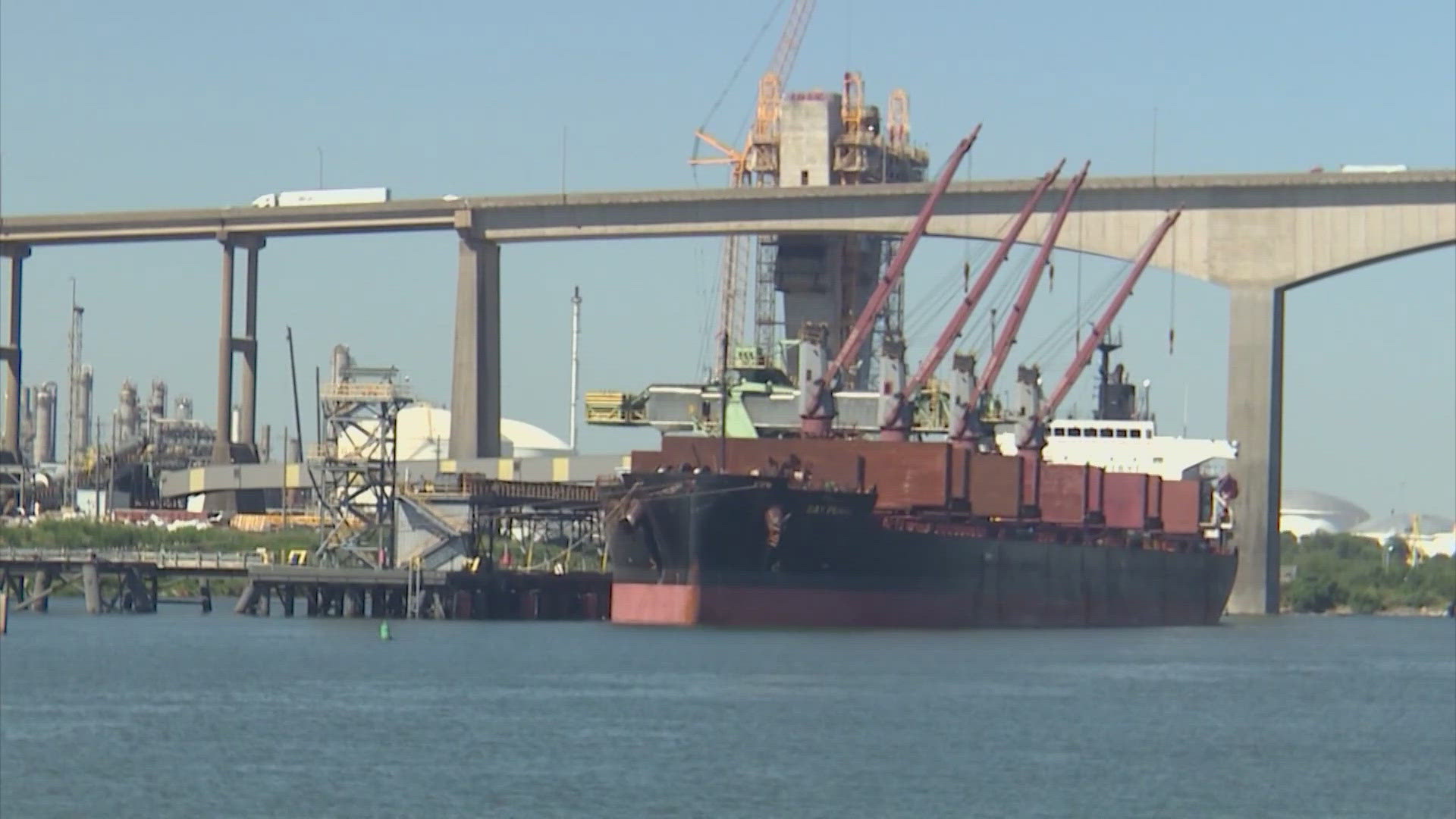HOUSTON — The first longshoremen strike in decades has shut down the container terminals in Houston and along the East Coast.
The strike began at 12:01 a.m. Tuesday and halted operations at ports from Brownsville to Boston. Dockworkers want wage increases, better health benefits and other things from ports and ocean carriers. Experts said it's unknown how long it will last.
At the Bayport Terminal, the strike would affect the container cargo, not the oil and gas commodities Houston is known for.
On Monday morning, the International Longshoremen's Association said it rejected a wage package from the United States Maritime Alliance (USMX). Experts said the sides aren't close on a deal. The ILA represents about 25,000 port workers along the East Coast and Gulf Coast bringing imports and exports to a screeching halt.
The workers union posted a statement accusing USMX of "blocking the path" to a deal on a new contract, saying, in part, the ocean carriers represented by USMX want to enjoy profits while they offer the ILA longshore workers an unacceptable wage package.
University of Houston supply chain and logistics technology program director Margaret Kidd said the strike could disrupt businesses across the country.
"A strike cutting off half of America, half of imports, could have a catastrophic impact on the economy if it was a prolonged strike," Kidd said.
The nonprofit research company Mitre said Houston could lose an estimated $91 million in imports and exports if the strike begins.
Kidd doesn't expect prices of goods to rise quickly.
"When we consider fresh fruits and vegetables, which are perishable and we're dependent on in South and Central America, if we have an extended strike, it could impact what we pay at the grocery store. Not going to impact it tomorrow, but it could within a couple of weeks," UH supply chain and logistics technology program director Margaret Kidd said. "Good news is most of the retailers anticipated this, they frontloaded cargo to arrive prior to peak season."
Kidd said you don't need to stock up on groceries and she expects President Joe Biden to get involved if a deal isn't reached closer to the election. She said there's no need to horde perishable groceries like fruits and vegetables.
"The reality is that while the two parties are far apart, at some point, the president will have to intervene because of the danger to the overall US economy. This strike is going to impact other countries, too," Kidd said.
USMX has previously said it wants to bargain and avoid a strike, but time ran out. It also said the ILA was not willing to return to the negotiating table.
Rice University Baker Institute Fellow and former Harris County Judge Ed Emmett said that depending on how long it lasts, the strike could end up costing billions of dollars due to undelivered containers. He said that even though the West Coast ports will be operating, he doesn't see shipping companies with cargo rerouting to California.
"They're not going to go all the way through the Panama Canal and pay those extra fees," he said.
Emmett said most of the shipping companies are foreign-owned and during the pandemic made record profits in a short amount of time.
The union representing the dockworkers took note.
"The ILA is saying, 'Well, wait a minute. These foreign companies are making all this money, we think the American worker who helped make that profit should share in it,'" Emmett said.
Emmett said there won't be an impact on the petrochemical industry, but the port itself will take a hit from other undelivered imports and exports.
"Seventy percent of the US exports go off the Atlantic Coast or the Gulf Coast, so that means those businesses selling their products overseas in Europe, India and Africa, they're not going to be able to sell their product," Emmett said.
Dockworkers also want a guarantee that they'll still have jobs in the future. They want assurances that driverless vehicles and other automated technology won't replace them.
From what KHOU 11 News was told, most of the cargo ships destined for the Port of Houston were sitting at sea and waiting for a resolution -- hoping it would be sooner rather than later.
USMX issued this statement on Monday:
"In the last 24 hours, the USMX and ILA have traded counter-offers related to wages. The USMX increased our offer and has also requested an extension of the current Master Contract, now that both sides have moved off their previous positions. We are hopeful that this could allow us to fully resume collective bargaining around the other outstanding issues – in an effort to reach an agreement.
"Our offer would increase wages by nearly 50 percent, triple employer contributions to employee retirement plans, strengthen our health care options, and retain the current language around automation and semi-automation."
What happens if the workers go on strike?
The existing contract between the workers and USMX expired at midnight Monday.
According to Port Houston officials, which isn't involved in the contract negotiations or discussions, in the event of a strike, it will close at 6 p.m. Monday and boat traffic will be completed by 7 p.m.
Port Houston terminal gates closed starting Tuesday. All container operations were suspended.
Rail operations at the terminals will be suspended for the duration of the work stoppage.
Port Houston said it won't charge ocean carriers storage fees on the days the terminal gates are closed.

